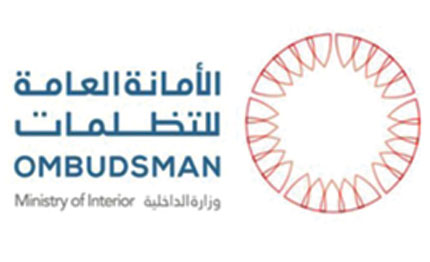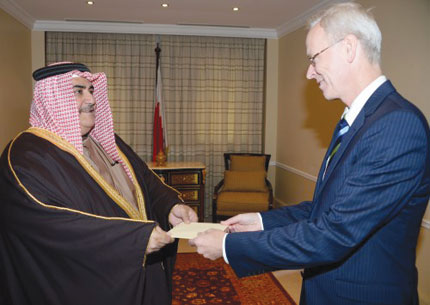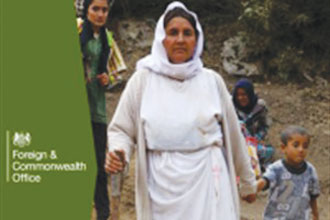
|
 |
 |
|
|
|
|
|
|
|
|
|
|
|
|
|
|
|
|
|
|
|
|
|
|
Human Rights Reforms Must ContinueThe Beginning of a Change in the
|
 |
| The Ombudsman Office at the Ministry of Interior |
Britain:
Of all the components of the international community, Britain’s view towards the development of human rights situation in the world is based on the principle of “encouragement rather than reprimand”. This has always been Britain’s approach when dealing with the human rights situation in Bahrain, which has now moved from the encouragement phase to providing technical assistance in the judicial and security fields. Britain’s Foreign Office has classified Bahrain in its periodic report on human rights and dem?cracy in the world, as a “Case study”rather than a “Country of concern” despite pressure from many members of the British Parliament. The British government’s argument was that Bahrain’s human rights situation is witnessing some progress. The British Foreign Office has noted the steady improvement in Bahrain in its annual report issued in March 2015:
“The government of Bahrain continued its efforts to strengthen police accountability and build oversight mechanisms across the criminal justice system. The Ministry of Interior’s Ombudsman’s Office, the Prisoners’ and Detainees’ Rights Commission, and the National Institute of Human Rights (NIHR) released their inaugural reports this year. Some progress has been made in implementing their recommendations, and we encourage the government of Bahrain to move resolutely to address the remaining recommendations in all three reports.
In December 2014, the Ministry of Interior’s Ombudsman and the NIHR received the EU Chaillot award for the Gulf region in recognition of progress made on promoting human rights”
“An investigation by the Special Investigation Unit (SIU) led to six members of staff, including three high-ranking officers, appearing before the High Criminal Court on 25 November. All six defendants pleaded not guilty, and the case was adjourned until a later date. In November, the SIU investigated video footage showing a person being assaulted in a police car, and charged the police officer in question. The SIU also probed nine cases of alleged torture and four cases of alleged mistreatment in December, which remain under investigation. It is crucial that police officers are held fully accountable for their actions and are sentenced accordingly.
Ombudsman’s Office figures in July 2014 showed that 14 officers had been charged with human rights violations. Of those, 12 are facing trial, one received a six-month sentence, and another faced disciplinary action. During his visit to Manama in December, the Foreign Secretary, Philip Hammond, raised his concerns about human rights issues with the King and Crown Prince of Bahrain”.
The report continues:
“The NIHR report, published in September, made recommendations on Bahrain’s judicial system. Some progress is being made. In November a Bahraini delegation carried out a study visit to Northern Ireland to learn about the juvenile justice system. SIU staff members also attended training sessions in the UK on forensic evidence, interviewing skills, and the rights of suspected persons. However, concerns remain about apparent inconsistencies and inequalities in sentencing”.
The report concludes:
“FCO Minister for the Middle East, Tobias Ellwood, hosted the fourth UK-Bahrain Joint Working Group on 4 December, which focused on reform and the UK’s technical assistance.
In 2015, the UK will continue to support the government of Bahrain in implementing its human rights and political reform programme through the provision of technical assistance, training, and best practice sharing. This will include support on reforms of the youth justice system, and court administration and further capacity building for key institutions such as the Ombudsman’s office”
Previously, the British Foreign Office said in its quarterly report released in October 2014:
‘Last June, the Bahraini Parliament passed a new law to grant wider responsibilities to the National Institute for Human Rights (NIHR) to investigate human rights violations and inspect detention places and that the NIHR identified in its report number of perceived shortcomings and made a series of recommendations, including the ratification of the Optional Protocol to the Convention Against Torture and the transfer of responsibility for detention and rehabilitation to the Ministry of Justice. The report also contained recommendations for the judicial system.’
The report added:
“whilst considerable efforts are being made to build trust in a fair and equitable justice system, the inconsistency and apparent inequality in sentencing has the potential to undermine this work.We welcome the NIHR report as an important benchmark for taking forward further human rights reform, and we encourage the government of Bahrain to consider the report and its recommendations carefully” It also noted:”Bahrain’s leadership publicly accepted the report and praised its comprehensive objectivity”.
The British Foreign Office’s quarterly report of October 2014 also affirmed:
“The Bahraini government has taken positive steps to increase engagement with the UN and international NGOs, which demonstrated a level of transparency. They welcomed the visit by Amnesty International in March and the two-month technical visit by the UN Office of the High Commissioner on Human Rights (OHCHR) in April.”
Thus, the British Foreign Office has continued defending its assessment of Bahrain’s progress in the field of human rights against all the criticisms leveled, especially in the British House of Commons, including from its subcommittee on Foreign Relations. One example is the response by the British Minister of state for Near Eastern Affairs, Tobias Ellwood, on December 18th, 2014, to inquiries by some MPs regarding the Foreign office’s evaluation of the human rights’ situation in Bahrain during the previou? six months. He said in that regard:
“We are supportive of the reforms underway in Bahrain and the steps taken by the Bahraini government to implement the recommendations set out in the Bahrain Independent Commission of Inquiry and UN Universal Periodic Review. Notable steps in the past six months have been:
The first annual report by the Ministry of the Interior’s Ombudsman’s Office, released in May, which detailed the cases it has dealt with since July 2013;
The first report of the Prisoners and Detainees Rights Commission in August, following its inspection visit to Dry Dock Detention Facility;
The report from the National Institute of Human Rights in September which identified a number of perceived shortcomings and made a series of recommendations to the Government of Bahrain.
I am pleased that the EU chose to award the Chaillot Prize to the Ministry of the Interior’s Ombudsman’s office and the National Institute for Human Rights (NIHR) in December for work to improve human rights in Bahrain. I will continue to encourage the Government of Bahrain to ensure that the reform programme continues and the recommendations made in the reports are implemented fully”.
 |
| US Ambassador with Bahrain’s Foreign Minister |
The United States:
Unlike Britain, the United States lacks the historical legacy and experience in dealing with the Gulf issues. Its handling of these issues has been marked by intermittency and an hesitancy that is exacerbated by the conflicting views among the various agencies of government such as the Pentagon, the Department of State and the Central Intelligence Agency (CIA). What further complicates the situation is the US administration’s inability to withstand the pressures from a multitude of sources starting with th? legislature (both houses of Congress) and ending with the pressure groups (lobbies) with their differing agendas, including international non-governmental organizations and the media. Perhaps this explains the unstable US State Department’s handling of the Bahrain human rights dossier, and the shadow such an inconsistency casts on the relations with Bahrain.
However, the positive steps undertaken by Bahrain have given the US State Department the opportunity to free itself from some of the pressure and allowed it to be less cautious with regard to expressing its appreciation for the progress made.
On September 24th, 2014, during the deliberation of the 27th session of the UN Human Rights Council in Geneva on the subject of technical cooperation between Bahrain and the commission, the US Representative Keith Harper said the following:
“We welcome the visit of an OHCHR technical team earlier this year. We believe that deeper engagement with OHCHR can help this organization play an important role in working with the Bahraini government in its efforts to improve the human rights situation in Bahrain.
We welcome the recent report by Bahrain’s National Institute for Human Rights.
In the interest of a strong and peaceful Bahrain we urge a sustained effort and willingness by all sides to compromise and to achieve real progress in the political and reform process.”
And on November 30th, 2014, the then spokeswoman for the US State Department, Jen Psaki, congratulated Bahrain on the conclusion of its 2014 parliamentary and municipal elections.
She urged all of Bahrain’s constituencies to work in good faith to resolve existing tensions, to seek constructive compromise, and develop a consensus on how to address Bahrain’s political, economic and social priorities. She stressed the need for all segments of the Bahraini society to reject violence and to contribute to a climate conducive for peaceful reconciliation.
Also on December 4th, 2014, the US Assistant Secretary of State for Near Eastern Affairs, Anne Patterson, and the US assistant secretary of state for Democracy and Human Rights, Tom Malinowski, held a press conference in Manama in which the latter stated the following:
“We met with new Ombudsman and the Special Investigative Unit, and hope that everyone will support their work. We welcome the support the government has given for the National Institution for Human Rights, and hope it will take seriously the recommendations the Institute has made. The reports produced by these national institutions are unique for this region, but reports must lead to results”.
The US Ambassador to Bahrain, William Roebuck, said, last March, that his country understands “the real threats to Bahrain from all sides” and that Washington “makes a clear distinction between those who practice violence and extremist groups that work to destabilize Bahrain and other groups that tend to exercise, in a peaceful manner, their right to criticize and express different viewpoints. Such groups have an important role to play in various communities and nations”.
The envoy viewed the recent parliamentary elections in Bahrain as “an important mean to address the legitimate aspirations of the Bahraini people” and added that His Majesty King Hamad deserves great credit for his role in consolidating reform in the country, supporting the National Action Charter in 2002, endorsing the recommendations of the Bahrain Independent Commission of Inquiry and supporting the National Dialogue 2013-2,014. He said that the government of Bahrain has taken significant steps towards?the implementation of the reforms set out in the report of the Independent Commission of Inquiry”.
But ambassador Roebuck stressed that “there is still work to be done, and we are ready to help in any way, whenever we are called upon to do so,” He added that there is no perfect society or country, and that the United States benefited greatly from criticism and recommendations made by observers and activists on human rights and abuses that have occurred in the United States, hinting that the same applies to Bahrain, and suggesting that the latter could benefit from staying open to continuing dialogue wi?h those citizens who peacefully support the reform efforts and strengthening the protection of human rights”.
The Ambassador drew attention to his awareness that Bahrain “has achieved a number of important steps in addressing some of the underlying causes of the events that occurred in 2011” adding that they support the “ongoing government initiatives to build on these efforts including the genuine efforts made by the Ombudsman Office” pointing as well as to “efforts aiming at strengthening the parliament, the establishment of the Special Investigation Unit, and the efforts exerted by the National Institute for Hu?an Rights, all of which are positive achievements that reflect the ongoing reform efforts in Bahrain”.
Finally, ambassador Roebuck explained that “the United States has repeatedly expressed its support for the reform efforts of His Majesty the King to consolidate the fundamental rights of all Bahraini nationals. These efforts, that incorporate the views of all Bahrainis in respect to the formulation of the decisions that affect them, offer encouraging examples of the sort of the confidence -building and institution-building measures, that could lead to more opportunities for dialogue, and a better protecti?n for fundamental rights”.
 |
| EU Ambassador hands the Chaillot award
to NHRI & Ombuds man Office |
European Union:
Since the outbreak of the events in Bahrain in February 2011, the European Union, both legislative and executive, continued to periodically criticize the human rights situation in Bahrain in its official statements and reports, blaming the Bahraini government for the deterioration of the situation. The European bloc, led by a number of parties, on top of which was Switzerland, continued consistently to adopt joint statements andto mobilize and lobby other countries to sign them. At one point they managed t? secure signatures from more than fourty countries to denounce what they described as violations by the Bahraini government.
However, the past months have, for the first time, witnessed some change in the European Union’s standpoint vis a vis the developments in the human rights situation in Bahrain. This change could be attributed mainly to the successful completion of the recent parliamentary and municipal elections; a significant step that illustrates the determination and seriousness of the Bahraini government towards carrying out its democratic and human rights responsibilities.
The following are some examples of what the European Union said in this regard:
● In September 25th, 2014, the official spokesman for the European Union issued a statement on the announcement of the date of the elections, saying that the “The European Union considers that credible and inclusive elections can represent one important element for the advancement of genuine national dialogue and reconciliation, thus promoting the necessary sustainable reforms in a spirit of shared responsibility in the interest of all Bahrainis”.
● On October 16th, 2014 and in the wake of the Bahraini opposition parties’ announcement of its boycott of the elections, EU ambassadors accredited to Bahrain issued a joint statement in which they expressed deep disappointment at this boycott decision, and appealed to these parties to reconsider their decision, noting that they in the EU, believe that it is imperative for rebuilding the trust and confidence necessary for stability and progress in Bahrain that all those committed to the democratic process ?articipate in the elections.
 |
|
| British Foreign Office report on human rights |
● In December 3rd, 2014, the EU representative in Riyadh announced that the Chaillot award for 2014 has been awarded to the National institution for Human Rights and the Ombudsman Office at the Ministry of Interior in recognition of their efforts in the field of promotion and protection of human rights in Bahrain.
International NGOs:
If we take into account that the previous periods have witnessed a steady stream of statements and reports by international human rights organizations condemning abuses, it is quite noticeable that the number of such statements has decreased considerably in the last few months , which was viewed as an evidence that Bahrain, through its official efforts and those made by its existing and newly found human rights institutions, and through the spirit of cooperation and interaction with the international hum?n rights community that it has shown, is moving in the right direction, that could only lead to further improvement and would pavethe way for the continuation of the reform process and the democratic building on a solid foundation of social stability and cohesion.
This steady improvement in the international community’s assessment of the human rights situation in Bahrain should not lead us to be complacent and reluctant to carry out further reforms, or address urgent issues such as holding perpetrators of violations accountable. Bahrain’s government is supposed to realize that there are still some concerns that will continue to be monitored by the international human rights community to see how the Bahraini authorities would deal with them.